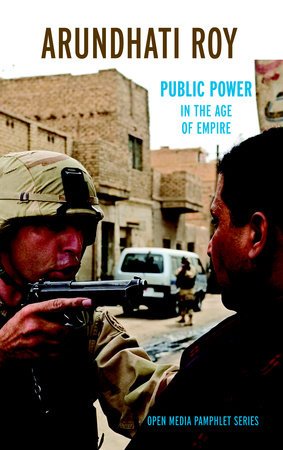Public Power in The Age of Empire

Rating: 3.6/5
Author: Arundhati Roy
Publisher: Seven Stories Press
Publishing Date: November 2004
Language: English
Genre: Non-Fiction
ISBN-10: 9781583226827
ISBN-13: 978-1583226827
ASIN: 1583226826
Format: Paperback
Pages: 64
Cost: Rs. 543 (Paperback)
Plot:
Arundhati Roy, in this book brilliantly examines the limits to democracy in the world today. Bringing the same care to her prose that she brought to her Booker Prize-winning novel ‘The God of Small Things’, Roy discusses the need for social movements to contest the occupation of Iraq and the reduction of "democracy" to elections with no meaningful alternatives allowed. She explores the dangers of the "NGO-ization of resistance," shows how governments that block nonviolent dissent, in fact, encourage terrorism, and examines the role of the corporate media in marginalizing oppositional voices.
Review:
She did what she usually does: Expose! Expose the power, the brutality of power, and the misuse of power.
She draws the Indian and American governments as her main examples and discusses the ways in which governments can wrongly influence the people they’re supposed to serve, and how elections portray the mirage of ‘one’s own choice’. In third world countries, the national agenda is not dictated by the needs of the people, but by the notion of ‘capitalism’ and everything benefitting that.
In the second half, she looks at some of the consequences that resistance movements face, such as their relationship with the mass media and the use of NGOs to defuse political resistance. Roy argues so strongly that her firm emotions affect her readers too.
She tells us that public power in the age of Empire can be forced to resort to terrorism, although not very clear if she is referring to violent resistance as a direct consequence of the government’s resistance in all forms. She inflicts that if governments are not open to change through non-violent resistance, then they are in fact endorsing violence as the only choice of action.
She writes in her other book ‘My Seditious heart’: “…then, from the ruins of Afghanistan, from the rubble of Iraq and Chechnya, from the streets of occupied Palestine and the mountains of Kashmir, from the hills and plains of Columbia, and the forests of Andhra Pradesh and Assam, comes the chilling reply: "There's no alternative but terrorism."
But here, Roy urges, hopefully-
“There is an alternative to terrorism. It's called justice.”
She writes with her political consciousness combined with her humane mind. She uses literary devices (irony, mockery) instead of reasoned argument, which can be purely believed as an overflowing passion for change to be seen around us. She is never at a loss for words and sarcasm is one of her commonly used weapons.
About the Author:
Arundhati Roy was born in 1960 in Kerala, India. She studied architecture at the Delhi School of Architecture and worked as a production designer. She has written two screenplays including Electric Moon (1992) that was commissioned by Channel 4 television.
Her first novel ‘God of small things’ won the Booker Prize for Fiction in 1997. An immediate bestseller, the novel was published simultaneously in 16 languages and 19 countries but caused controversy in India for the description of a love affair between a Syrian Christian and a Hindu 'untouchable'. She is also the author of several non-fiction books including The Cost of Living (1999)- a highly critical attack on the Indian government for its handling of the controversial Narmada Valley dam project and for its nuclear testing program; Power Politics (2001)- a book of essays; and The Algebra of Infinite Justice- a collection of journalism. The Ordinary Person's Guide to Empire was published in 2004. She has since published a further collection of essays examining the dark side of democracy in contemporary India ‘Listening to Grasshoppers: Field Notes on Democracy’ (2009).
Her latest book is ‘The Ministry of Utmost Happiness’ (2017), her second novel. It was longlisted for the Man Booker Prize and, in the US, was a finalist for the National Book Critics Circle Award. For her work as an activist, she received the Cultural Freedom Prize awarded by the Lannan Foundation in 2002.















































